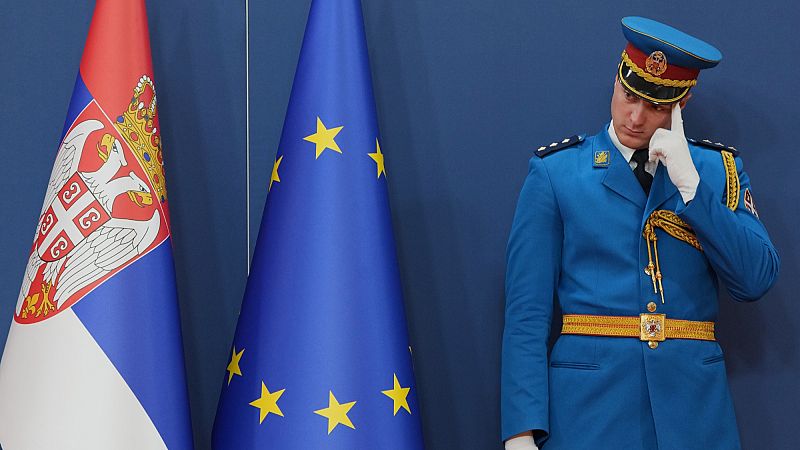Serbia’s EU bid: Necessity-driven joint ambition facing foreign policy hurdles

Serbia’s journey toward the European Union began in January 2001, when pro-European parties won parliamentary elections following the fall of Slobodan Milošević in October 2000.
At the time, some observers even speculated that the Federal Republic of Yugoslavia — which would cease to exist in 2006 after Montenegro’s withdrawal — could join the EU as early as 2007.
Reality soon proved more complicated. Kosovo, under UN administration after the 1999 war, is legally part of Serbia under UN Resolution 1244. It declared independence in 2008, a move that Serbia does not recognise.
Long before signing the Stabilisation and Association Agreement SAA) and obtaining EU candidate status in 2009, Serbia faced multiple challenges. The country has struggled to cooperate with the International Criminal Tribunal for the former Yugoslavia (ICTY) at The Hague, suffered a collapsed economy, and faced an ethnic Albanian separatist insurgency in the southern regions of Bujanovac and Preševo.
Despite these hurdles, the country embarked on a long-term path toward European integration, a goal that remains central to Serbia’s political strategy today.
From early optimism to declining support
In the early 2000s, more than 70% of Serbians supported EU integration. Today, that figure has dropped to around 40%. Public enthusiasm has waned, yet political leadership continues to champion the European path.
Prime Minister Đuro Macut emphasised that Serbia’s European orientation is not only a strategic priority but also a promise of a better life for citizens.
“Serbia’s European future is not only a political goal but also a guarantee of further development, progress, and a better life for our citizens," Macut told Euronews Serbia.
The government has continued to implement reform measures and modernise its institutions, signalling to Brussels that Serbia is serious about its commitments.
Macut highlighted that Serbia has achieved 61% alignment with the EU’s Common Foreign and Security Policy, underscoring tangible progress while leaving room for further reforms.
Beyond political and legal harmonisation, energy security remains a critical focus. Serbia is working to guarantee stable gas, oil, and electricity supplies, cooperating closely with regional partners, including Hungary.
“Serbia must maintain complete energy independence and stability, even under complex international conditions,” Macut said.
This dual focus on European alignment and energy resilience reflects the broader strategy of securing both international credibility and domestic stability.
Debates over EU enlargement
At the same time, Brussels has been discussing a new model for enlargement: partial membership, where new countries could join without full voting rights. The idea has sparked controversy across the Western Balkans.
Montenegrin Prime Minister Milojko Spajić rejected the proposal outright, emphasising that sovereignty cannot be compromised.
Croatian Prime Minister Andrej Plenković also voiced reservations, concerned that Serbia’s eventual membership could shift institutional influence within the EU.
“Croatia would not be very eager to see Serbia in the EU, as that would strengthen Serbia’s position within EU institutions,” said Slobodan Zečević from the Belgrade-based Institute for European Studies (IES).
Meanwhile, Bosnia and Herzegovina continues to lag behind, described by Amil Dučić, editor of Sarajevo-based outlet Fokus, as the “worst student” in the region when it comes to EU integration.
These debates highlight the delicate balance between political ambition, regional dynamics, and the EU’s own capacity to absorb new members.
Serbia’s road ahead
Nemanja Starović, Serbia’s minister for European integration, acknowledged the public’s growing impatience with the slow pace of accession.
“Despite dissatisfaction, giving up on EU integration would be a mistake. Joining the EU is in Serbia’s national interest," he told Euronews.
Analysts suggest Serbia could be ready for membership by 2030, although several hurdles remain. Political obstacles, regional rivalries, and energy dependence on Russia continue to complicate the path.
“It’s very difficult for us to live without Russian gas. Alternatives exist, but for now, we rely heavily on Russia,” Zečević said.
While partial membership has been proposed as a temporary solution, many experts see it as a stopgap that risks undermining the EU’s principle of equal footing for all members.
Past enlargement demonstrates how early joiners can block their neighbours: Slovenia blocked Croatia, Croatia now blocks Serbia, and Bulgaria blocks North Macedonia. Montenegro and Albania appear most prepared for accession by 2030, earning greater sympathy from the EU.
“The EU currently has the most sympathy for Montenegro and Albania,” Zečević said. “Partial membership would merely delay institutional reform.”
Regional rivalries, internal political challenges, and unresolved issues like Kosovo continue to shape the Western Balkans’ EU trajectory, making membership both a long-term goal and a delicate strategic endeavour.
This article was exclusively written for Euronews by Euronews Srbija, ahead of our flagship EU Enlargement Summit on 4 November, which will be broadcast live and on YouTube.
Yesterday

